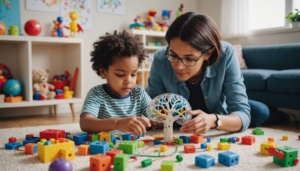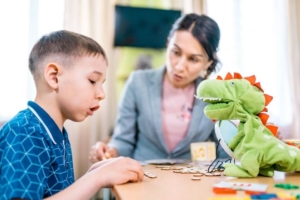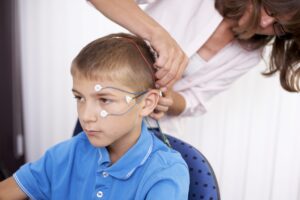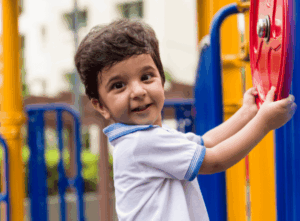MahdisMaghsudloo1*, MahbubeAbbasian2, EbrahimPishyare3 ,RoghiehHatami4
۱٫ Corresponding author: MA in Psychology, Department of Psychology, TarbiatModares University of Tehran,Tehran, Iran.
۲٫ MA in Psychology, Department of Psychology,Alzahra University of Tehran, Tehran, Iran.
۳٫Phdin Neuroscience, Department ofOccupational Therapy,University of Social Welfare and Rehabilitation Sciences of Tehran,Tehran, Iran.
۴٫MA in Occupational Therapy, University of Social Welfare and Rehabilitation Sciences of Tehran,Tehran, Iran.
Introduction: Autism spectrum disorders comprise a complex set of related developmental disorders that are characterized by impairments in communication, repetitive behaviors and sensory processing.
Objective: Sensory over-responsively can negatively affect developmental and functional abilities in behavioral, emotional, motoric, and cognitive domains. The aim of this study was to assess the relationship between sensory over-responsively on social maturity of autistic children.
Methods: This was a descriptive study. The sample included 38 autistic children who were selected with convenience sampling. Their parents filled out Sensory Over-responsively Questionnaire and Vineland Social Maturity Scale. data were analyzed using correlation coefficient and regression analysis.
Results: Correlation results indicated a significant relationship between sensory over- responsivity with social maturity(R≤-۰/۴۶, P=0/01). Regression analysisalso revealed that Tactile and movement subtypes of over responsivity can predict social maturity (p<0/05).
Conclusion: The results from this study suggest that early sensory interventions can have positive effects on social maturity symptoms, so early sensory intervention could be effective in treating some symptoms of autism.
Keywords: Autism, Sensory Over-Responsivity, Social Maturity
PTH-46- Title: The Effect of Play Therapy on Communication Skills of Autistic Children
Akhavan, Behrouz1*.Pishyareh, Ebrahim2 .Robubi, Hossein3.
۱٫ Corresponding author: Clinical Psychology, B.S., Azad University, Tehran, Iran.
۲٫Cognitive Neuroscience, PhD ,Department of occupational therapy, The university of social Welfare and Rehabilitation Sciences, Tehran, Iran.
۳٫Occupational Therapist, B.S. , Department of occupational therapy, The university of social Welfare and Rehabilitation Sciences, Tehran, Iran.
Introduction: Disturbances of social function, especially in initiation and communication with others have been proposed as the main problems of children with Autism Spectrum Disorder (ASD).Most of the studies have confirmed that autistic children do not pay attention to “social cues”, and are unable to make and maintain eye contact, cannot accomplish their favorite functions, fail to understand others’ expectations, have weak imitative pattern and do not participate in games.
Objective: The aim of this study was to find clinical and practical solutions on how to initiate and start a communication with ASDs children in order to develop strategies for improving their social skills which are based on rehabilitation interventions.
Method: In this study, 20 children aged 4 to 7 with ASDs participated in the play therapy sessions for 2 months. The approach of this study was based on Dunn’s Model of Sensory Processing and adopted with free playing sessions. The results were evaluated withCBCL (Child Behavior Checklist) before and after intervention.
Result: After 2 months of participation in the play therapy sessions, children demonstrated significant differences in behavior patterns and appropriate social skills indexes.(p=0.05)
Conclusion: The applications of play therapy methods with focus on improving communication skills may develop the behavioral capabilities and reduce misappropriate behavioral patterns in ASD children.
KeyWords: Autism, CBCL, Play therapy, Communication skills
PW-3-Evaluation of Tactile and Auditory Over-Responsively in Children with Attention Deficit Hyperactivity Disorder
RoghiehHatami1, FatemehBehnia2, Mehdi Rassafiani3, EbrahimPishyareh4*, Maryam Mahmodirad5, MarjanFarzi6
۱٫MSc, Department of Occupational Therapy , The university of Social Welfare and Rehabilitation Sciences, Tehran, Iran
۲٫MSc, Department of Occupational Therapy, Pediatric Neurorehabilitation Research Center, The university of Social Welfare and Rehabilitation Sciences, Tehran, Iran
۳٫Phd, Department of Occupational Therapy, Pediatric Neurorehabilitation Research Center, The university of Social Welfare and Rehabilitation Sciences, Tehran, Iran
۴٫Corresponding Author: Phd, Department of Occupational Therapy, The university of Social Welfare and Rehabilitation Sciences, Tehran, Iran
۵٫MD,Department of Psychiatry, The university of Social Welfare and Rehabilitation Sciences, Tehran, Iran
۶٫MSc, The university of Social Welfare and Rehabilitation Sciences, Tehran, Iran
Introduction: Problems experienced by children with Attention Deficit Hyperactivity Disorder (ADHD) in activity of daily living (ADL) and social interactions are very similarto observed symptoms in Sensory over-responsively (SOR). SOR is characterized by faster, longer, or more intense responses to sensory stimuli in comparison with typical sensory responsively.
Objective: The aim of this study was to determine tactile and auditory responsiveness in children with ADHD.
Methods: This was a descriptive-analytical and comparative research. Parents of 48 children aged 6 to 11 with ADHD and 48 normal children matched for age and gender completed the Sensory Over-Responsively Inventory. Test results were evaluated with T-test and Chi Square Test.
Results: Children with ADHD demonstrated statistically significant differences in all items of their tactile and auditory responsiveness including dressing, ADL and tactile stimulation compared with normal children (p<0/01). Furthermore, the mean scores of ADHD children in both noises and chattering and crowds in public centers showed significant differences when compared with normal children.
Conclusion: The results indicated that children with ADHD suffer from increased levels of tactile and auditory responsiveness more than normal children. Assessment of sensory over-responsively in children with ADHD and referring them to early intervention is important and can improve their social interactions and performance at home and school.
Keywords: ADHD, Auditory Stimulation, Evaluation Sensory Over-responsively, Tactile Stimulation








